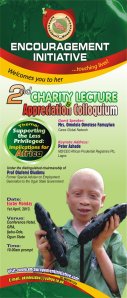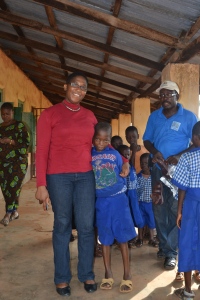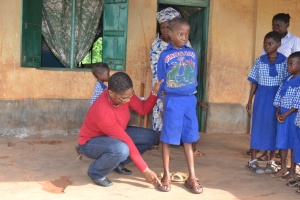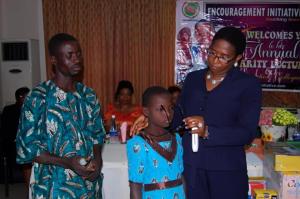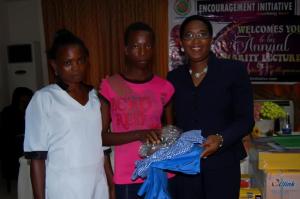As Willows Magazine plans to make a worthy representation at the 6th World Summit on Media for Children & Youth, our Columnist, Popoola Dickson, who is one of the delegates writes on the relationship between the media and young people. Read and remember to send us your feedback.
In general, “media” simply means the various means of communication. For example, the Radio, Television, Newspapers & Magazines and the Internet are different types of media. The term can also be used as a collective noun for the press or news reporting agencies. In the computer world, the term refers to the different types of data storage options. Understanding what the media is will help us to relate the term “media” with the youths to fully understand the problems and developments faced in today’s world as it concerns the youth and media. Youth according to the United Nations is the age between 15 and 25 but here I would stretch my coverage area to children.
Let me jump in on it, the media casts youth in a constant bad light and habitually portray the youths in an overwhelming negative image. The press has minimal youth representation, a chunk of press stories involve young people committing or associated with crimes. We have heard gory tales of teenagers killing a police officer, a teenage boy assassinating his parents, young people threatening school massacre etc. Interestingly, the media have a seemingly direct influence on the results of youth violence; many of these crimes has been traced to the influence of songs with heavy lyrical contents, negative adverts, negative religious values portrayed within the media etc.
So many negative media images have featured suffering and dying children in poor parts of Africa, tragedy images from political conflicts, pandemics and natural disasters have featured children. The relationship between the children and the media goes a long way in realizing the child’s right to identity, dignity and self-respect. The media should and have the ability to report positively on young people, identify and celebrate our achievements and not focus on horrible pictures of malnourished naked children… The youths need to be represented fairly.
The generation of young people really needs information in all aspects of the media; we need to find ways to promote our own active participation in the media and media development. We the young minds need to learn as much as we can about the media in order to make right choices as media consumers so as to maximize our potential and open ourselves up for optimum benefit. The government also plays a key role in how we should be represented. We should be seen as potential clients rather than bothersome consumers. The young people are real investments; if only the government could see that we are less expensive as educated and nationally conscientious than as radicals or criminals.
We need to play an important role in making a significant impact in the society. To achieve this, we need to understand the issues affecting us and the proper way to communicate these issues to the necessary authorities. In Nigeria for example, the young people are being deprived of their rights to good education, to good health and basic needs. To become critical thinkers, we need to be more creative. To become tomorrow’s leaders, we need to be empowered and catered for. The youths should be represented in all areas adequately. Report about young people should be in a fair and accurate manner as they do to other groups. The image of young people engaged in anti-social activity, violent outbursts, unreasonable behaviour, crime and drug abuse has become a favourite of the press as it generates strong feelings of moral outrage and antagonism but this should be stopped. Instead, young people’s innovations and inventions should be made known through the media.
The body governing broadcast in Nigeria, National Broadcasting Corporation (NBC) should look seriously into the adequacy and appropriateness of programmes and programming for young people. The days of cartoon and musical fillers especially those with violence (e.g. Tom & Jerry) and immoral language, should be gone for good. Local content should be encouraged and the percentage decided by NBC should be enforced. When the media start paying fines for not providing adequate and appropriate content; the stakeholders will sit up tight and do what is right.
The theme for the International Children’s Day of Broadcasting (ICDB) this year is, “All Rights, All Children.” Hence quality content should not only be tailored to the children of the rich or educated. Giving those who do not know any better programmes of low quality only further enmesh them in their current state. Giving all young people quality, adequate and appropriate programmes at the time they are available to watch will develop young people towards becoming wholesome citizens.
There is need for we young people to change our “siddon look” attitude. You have a right to complain about the programmes you see on air or the columns labeled for children in the papers or on the internet if you feel uneasy about the content, quality, language etc. The more letters we write, the more calls we make, the more visits to the General Managers would make those in charge see that we are stakeholders who know our rights and are ready to stand up for those rights. Plus the better the quality of the programmes, the more likely sponsors and advertisers would come on board to keep the programmes alive and the more children would have access to participate in media.
It is a shame that parents who were once young vote against sponsorship of children’s programmes. Kudos to companies that advertise on children’s pages, programmes, magazines. We celebrate you! You are the reason young people are being educated, informed, entertained. For the others still sitting on the fence; don’t wait till it becomes illegal not to have a chunk of your advertising budget devoted to children and youths.
In conclusion, publishing and airing the right things at the right time and getting a media system that supports media makers so they can do what they do best: create media that reflect real people would work best. It is believed that fewer people listen to the children and young people yet, we have revealing insights to offer adults and the public. We the young people should be approached by key media players to give opinions and also to share our views on issues affecting the populace globally.
The Convention on the Rights of the Child (CRC) should be promoted and accessible to young people so they are well informed about their rights and determine ways to contribute to the fulfillment of these rights and carry out responsibilities attached to these rights. There should be proper media education especially about development in new media technologies and products and also for the protection of harmful media contents which is really an important factor. The role the media plays in the lives of the young people necessitates that media literacy should be part of the school curriculum.
We the young people are represented in the media in various ways through the mass media. There is a need for the young minds to be heard and the role of the young people in making huge contributions to the development of the society at large should be celebrated. We need to encourage a media that ensures young people are given the chance to comment on issues affecting them; to avoid repeated words like “yobs”, “thugs”, “criminals”, “bullies”; and to recognize that most young people are disciplined, law abiding citizens that are against crimes and more interested in becoming good leaders.
Culled from Willows Magazine
Written by Popoola Dickson
Edited by Omolola Famuyiwa


